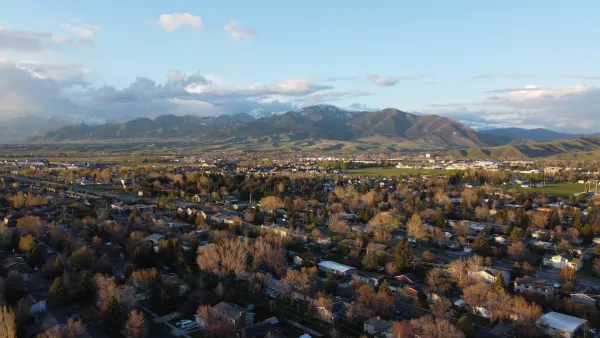Stephen Henderson pens a strongly worded response to the story of James Robertson, who commutes by foot up to 21 miles a day between Detroit and Rochester Hills. Robertson is a source of pride—the transit system that neglects the region, a disgrace.
According to an editorial by Stephen Henderson, the outpouring of support for James Robertson since the story of his epic commute went national acknowledges a particularly honorable example of resilience. But it also misses a larger point about the transit system in the Detroit metropolitan area: "It's a basic in nearly every other major metro area. Here, it's a pipe dream."
"Robertson's troubles reflect profound policy failures: a pitiful arc of non-action, stretching more than 40 years, that has made this one of the nation's least commuter-friendly metro areas….This region has been unable -- and unwilling -- to weave together a sensible public transit network. While Robertson's circumstances are extreme, he's but one victim of our collective neglect.
Henderson lays the blame at the feet of the politicians and bureaucrats pulling the strings of the region's two "under-funded, dysfunctional bus systems," run by the the Detroit Department of Transportation and the Suburban Mobility Authority for Regional Transportation. Henderson focuses especially on the system that allows communities to opt out of the SMART system. According to Henderson, the opt out policy "has always sported a sharp cultural edge, because it nudges up against the notion that some communities don't want 'those people,' be they Detroiters or blacks or bus riders, coming through their locales."
And as a final example of the strong words Henderson uses in reaction to the state of transportation in and around Detroit: "If the opt-out's cultural noxiousness weren't enough, its practical failures should badly embarrass leaders in every corner of metro Detroit."
FULL STORY: Awful transit policy fails everyone in metro Detroit

Planetizen Federal Action Tracker
A weekly monitor of how Trump’s orders and actions are impacting planners and planning in America.

San Francisco's School District Spent $105M To Build Affordable Housing for Teachers — And That's Just the Beginning
SFUSD joins a growing list of school districts using their land holdings to address housing affordability challenges faced by their own employees.

The Tiny, Adorable $7,000 Car Turning Japan Onto EVs
The single seat Mibot charges from a regular plug as quickly as an iPad, and is about half the price of an average EV.

Seattle's Plan for Adopting Driverless Cars
Equity, safety, accessibility and affordability are front of mind as the city prepares for robotaxis and other autonomous vehicles.

As Trump Phases Out FEMA, Is It Time to Flee the Floodplains?
With less federal funding available for disaster relief efforts, the need to relocate at-risk communities is more urgent than ever.

With Protected Lanes, 460% More People Commute by Bike
For those needing more ammo, more data proving what we already knew is here.
Urban Design for Planners 1: Software Tools
This six-course series explores essential urban design concepts using open source software and equips planners with the tools they need to participate fully in the urban design process.
Planning for Universal Design
Learn the tools for implementing Universal Design in planning regulations.
Smith Gee Studio
City of Charlotte
City of Camden Redevelopment Agency
City of Astoria
Transportation Research & Education Center (TREC) at Portland State University
US High Speed Rail Association
City of Camden Redevelopment Agency
Municipality of Princeton (NJ)




























